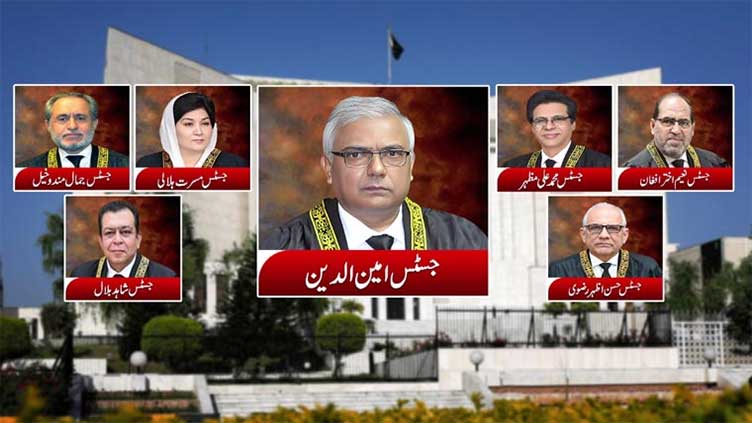Why do you want SC to do what parliament should do, asks Justice Afghan

Pakistan
Justice Rizvi remarked that arson, siege and vandalism have become order of the day
ISLAMABAD (Dunya News) – Justice Naeem Akhtar Afghan on Tuesday questioned during the hearing of civilians trial in military court that why do they want the Supreme Court to do the work that is supposed to be done by the Parliament?
Justice Afghan gave the remarks while appellant’s counsel Salman Akram Raja argued that the original decision stressed that courts cannot be established outside Clause 3 of Article 175.
The justice remarked that the country has a constitution [of 1973], and all the rules framed under the martial law were reviewed under the 18th Amendment.
You gave the example of India, where the law was changed through the parliament.
A constitutional bench of the Supreme Court, headed by Justice Amin-ud-din Khan, and including justices Jamal Khan Mandokhail, Muhammad Ali Mazhar, Justice Hassan Azhar Rizvi, Musarat Hilali, Naeem Akhtar Afghan and Shahid Bilal Hassan, resumed hearing of the intra-court appeal after a day’s adjourment as Advocate Raja could not reach the court in time.
Raja tendered apology for failure to reach the court due to traffic jam. Justice Mandokhail asked the counsel to complete his arguments today, to which Raja said he would do that tomorrow.
Earlier, Justice Rizvi remarked that arson, siege and vandalism have become order of the day. The footage of the May 9 incidents was aired by TV channels. Corps Commanders' houses were attacked and vandalized. The same thing happened in Bangladesh and Syria; this has become a culture, he observed.
Justice Mandokhail remarked that trespassing the house of a common citizen is a crime.
Raja submitted that the clause 3 of Article 175 should also be applied to army officers.
Justice Afghan remarked that the court would examine that when any military officer was involved. He reminded the counsel that he should restrict his arguments to the [present] case.
Justice Rizvi questioned has there ever been an attack on corps commander's houses anywhere in the world, to which Raja said he will also give examples.
Advocate Raja referred to the decision to declare the Law Reforms Ordinance null and void. Justice Mazhar questioned him whether legislation was done on what was pointed out in the court decisions.
Justice Mandokhail wondered what was going on in the parliament. The points you raised should have been contemplated and acted upon by the parliament. Advocate Raja replied that it was judicial authority to give punishment.
The justice observed that all the decisions you quoted were of the Balochistan High Court.
Advocate Raja submitted that he studied the history of the constitution of Pakistan. The Balochistan High Court always gave decisions to protect ordinary citizens during the martial law. The late Justice Waqar Seth of the Peshawar High Court also gave a decision that set precedence. His decision was also referred to the International Court of Justice. His decision was suspended by the Supreme Court.
‘LET ME TELL THE TRUTH WHY ACCUSED DIDN’T MOVE COURT’
Justice Mandokhail asked Advocate Raja why the accused did not challenge transfer of their case to the military courts. Wasn’t this negligence on the part of the accused?
The counsel said that it was not negligence. “Let me tell you the truth. The accused and their families had to go through difficult circumstances. Ten accused had appointed me as their lawyer. But, before filing petition, their families called him and forbade him to move the high court for fear of other members of their families.”
However, one of the accused, Junaid Razaq, refused to withdraw the petition. “I salute him. I will write a book on Junaid; it’s a hero’s story,” he added.
Later, the court adjourned the hearing until tomorrow.


